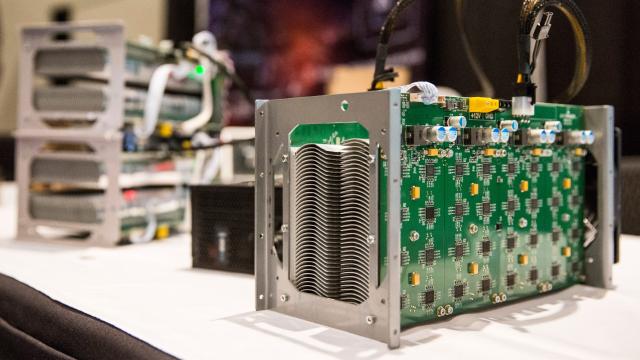The people of Plattsburgh, New York have had enough. Yesterday, the city council approved an 18-month moratorium on new cryptocurrency mining operations. The temporary ban will be used to figure out what to do with these ding dong miners using up all the electricity.
Photo: Getty
Most cryptocurrencies require a “mining” process in which servers are used to guess the solution to a complex equation – the computer that gets the answer gets the newly-minted coin. It takes a lot of electricity to be a miner, and the ones who are successful tend to use a large network of mining rigs. To cut down on their energy expenses, miners have flocked to cities with cheap power, and we’re just beginning to learn what cost that brings for the municipalities themselves.
At its most recent city council meeting, Plattsburgh took up the issue and decided that no new mining operations will be allowed for the next 18 months. Existing operations will not be affected by the moratorium. Plattsburgh Mayor Colin Read told Motherboard his city has the “cheapest electricity in the world” thanks to its close proximity to a hydroelectric dam. The national average for electricity costs is just over $US0.10 ($0.13) per kilowatt-hour; in Plattsburgh, it’s just $US0.045 ($0.06). But the city decided to offer industrial operations an even better rate of $US0.02 ($0.03) per kilowatt-hour. And then the miners came to town.
According to Motherboard, Plattsburgh gets 104 megawatt-hours of electricity per month and if it exceeds its allotment more has to be purchased on the open market at a significant premium. In January, Plattsburgh used too much electricity and the bills for everyone in town rose, in some cases by $US100 to $US200 ($128 to $257). While this has been known to happen in the winter months, the state Public Service Commission (PSC) concluded that the average resident in Plattsburgh saw a $US10 ($13) increase on their bill in January just because of two cryptocurrency companies. The largest operation, Coinmint, used about 10 per cent of the city’s power in January and February.
Local lawmakers plan to work with the mining operations that are already present and use the moratorium to buy time while they come up with a permanent solution. Yesterday, the PSC gave upstate power authorities the ability to impose tariffs on cryptocurrency miners, and Read told Motherboard it’s possible that they will be required to cover any overages.
But it all raises a larger question about the economic value of Bitcoin. When a town drops its electricity rates to encourage industrial investment, and all the extra electricity gets used by miners, what benefit comes to the town? Coinmint is a Puerto Rico-based company, and mining operations don’t exactly create a lot of jobs. One resident, Tom Hilsworth, told NBC 5 that he fears Plattsburgh will miss out on the blockchain boom if it isn’t friendly to mining operations. But the blockchain doesn’t really produce anything. Some people are making space bucks that can be converted into taxable dollars, and some random new technical positions are being created, but it’s all a far cry from the economic benefits of a traditional industry moving in. And with the cryptocurrencies sagging, the whole enterprise is delivering diminishing returns.
